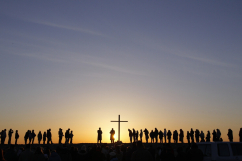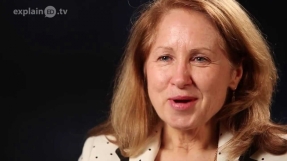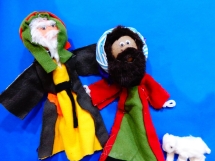I hate it when I get labelled. I resent that shocked expression on people's faces when I walk into a room and speak English. And by the way, my Dad doesn't run a corner shop.
I hate it when I attend a school meeting, and the teacher gives me no eye contact, as though I were just there as backup for my wife with no personal vested interest in my own child's education. Or when I am in a meeting with social workers and a professional child expert tells me that all Christians say grace before meals, exorcise demons as a response to misbehaviour, and can't be trusted not to brainwash their children.
I can't stand it when people think that because I am evangelical, I hate gay people. Just because I have a PhD it doesn't mean I won't buy clothes in a charity shop. Just because I am over 40, it does not mean I like golf. Just because I support Liverpool Football Club does not mean I put down Everton supporters. Not usually, anyway.
The point is, just because you know something about me, does not mean you know everything about me. That's called prejudice.
The instinctive prejudging of a situation is a survival tactic our brains have developed as a shorthand way of dealing with complexity. Sometimes it can be harmless, indeed useful. If I see a child crying at my daughter's school, I quickly make a judgment based on their size, dress and posture, and say something appropriate to their age and situation in a tone of voice that I think will help them.
Or suppose I'm walking home late at night and come across a group of very loud, inebriated young men carrying bottles and wearing hoodies. In order to protect myself I make some snap judgements to decide the the appropriate fight or flight response.
But these basic instincts and generalisations should not be the defining aspect of how we treat another person. Often we need to rise above instinct and gut reaction and choose to withhold judgment and assume nothing until we know more.
This is a way in which we show ourselves to be truly human, treating people with dignity not prejudice. And an important way in which we show ourselves to be truly Christian is to go one step further and love others, whether they're our neighbours or our enemies.
Jesus modelled this in his public ministry. Let me take a little liberty in translating one of his most famous teaching stories for a contemporary challenge.
A man was walking from Westminster to Tower Hamlets. Alone in the dark he was assaulted and left lying in the gutter. Along came a guy who said that this was a terrible indication of the state of modern Britain. In a truly Christian country these things wouldn't happen. In fact he would go straight home and blog about the terrible influence of the Islamification of our society.
Then a woman came by who was equally upset. She couldn't even look at the poor man, but later reflected on the need for the gospel to get to the down-and-outs. When she got home she opened her laptop and wired some money over to a charity she had supported before.
Finally along came another man. He had been raised on a council estate, the son of a bus driver and a seamstress. A Muslim, he had spent his career working to defend those who had been victims of racial abuse and human rights violations. When he saw the man's injuries, he stopped to help. He gave freely of his time and his money to look after the man while he waited for the paramedics, and when he was done he decided he wanted to work to make the whole of London a safer place.
Jesus challenged the racial profiling of his day by daring to make the hero of his most famous parable a Samaritan. The Jews looked down on the extremist Samaritans with their odd teachings and strange religious rituals. Jesus smashes the stereotypes by arguing that someone with the wrong theology could still do some good in the world. In fact he could do better in the world than those with the so-called right theology.
If Jesus were telling the parable in the UK today, I think he would have good reason for challenging some of us who call ourselves Christian by casting a 'Good Muslim' in the role.
When some Christians portray London mayor Sadiq Khan as being an Isis sympathiser just because he has shared a platform with an extremist, or have argued that he has encouraged people to make spurious racial harassment claims, or declare his success an indicator of a conspiracy amongst Muslims to take over the world, I have to protest. As Christians we must challenge blatant prejudice and judgmentalism and offer grace and compassion, instead of spreading fear and hatred and Islamophobia in a case of block-thinking gone badly wrong. We Christians know what it is like to be unfairly labelled extremists or fundamentalist bigots, or manipulative brainwashers. We must not unfairly label others.
And so I congratulate our new Mayor of London, Sadiq Khan, for his win in the fair and democratic election this week. Just as I celebrated Barack Obama's win as American President, or Nadiya Hussain's British Bake Off Champion title as victories over racism, so I welcome a new era in UK history that Khan symbolises.
Now I wait to see which of his policies and ideas I can support, and if he can indeed make London a safer place for all of us.
Rev Dr Krish Kandiah is President of the London School of Theology and founder and director of Home for Good.

















